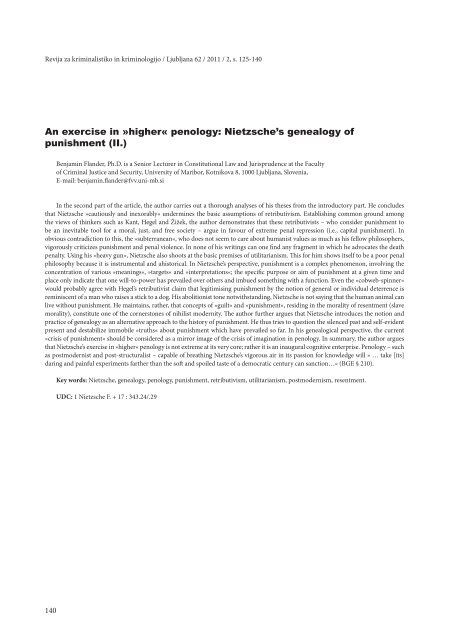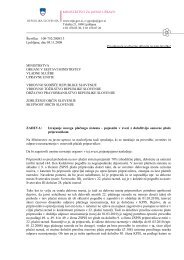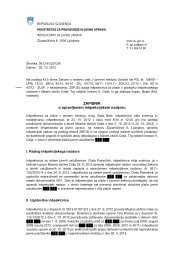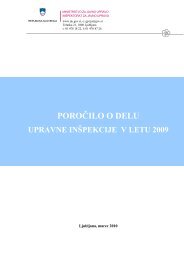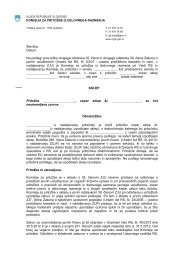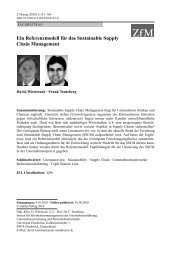Revija 2, 2011 - Ministrstvo za notranje zadeve
Revija 2, 2011 - Ministrstvo za notranje zadeve
Revija 2, 2011 - Ministrstvo za notranje zadeve
- No tags were found...
Create successful ePaper yourself
Turn your PDF publications into a flip-book with our unique Google optimized e-Paper software.
<strong>Revija</strong> <strong>za</strong> kriminalistiko in kriminologijo / Ljubljana 62 / <strong>2011</strong> / 2, s. 125-140<br />
An exercise in »higher« penology: Nietzsche’s genealogy of<br />
punishment (II.)<br />
Benjamin Flander, Ph.D. is a Senior Lecturer in Constitutional Law and Jurisprudence at the Faculty<br />
of Criminal Justice and Security, University of Maribor, Kotnikova 8, 1000 Ljubljana, Slovenia,<br />
E-mail: benjamin.flander@fvv.uni-mb.si<br />
In the second part of the article, the author carries out a thorough analyses of his theses from the introductory part. He concludes<br />
that Nietzsche »cautiously and inexorably« undermines the basic assumptions of retributivism. Establishing common ground among<br />
the views of thinkers such as Kant, Hegel and Žižek, the author demonstrates that these retributivists – who consider punishment to<br />
be an inevitable tool for a moral, just, and free society – argue in favour of extreme penal repression (i.e., capital punishment). In<br />
obvious contradiction to this, the »subterranean«, who does not seem to care about humanist values as much as his fellow philosophers,<br />
vigorously criticizes punishment and penal violence. In none of his writings can one find any fragment in which he advocates the death<br />
penalty. Using his »heavy gun«, Nietzsche also shoots at the basic premises of utilitarianism. This for him shows itself to be a poor penal<br />
philosophy because it is instrumental and ahistorical. In Nietzsche’s perspective, punishment is a complex phenomenon, involving the<br />
concentration of various »meanings«, »targets« and »interpretations«; the specific purpose or aim of punishment at a given time and<br />
place only indicate that one will-to-power has prevailed over others and imbued something with a function. Even the »cobweb-spinner«<br />
would probably agree with Hegel’s retributivist claim that legitimising punishment by the notion of general or individual deterrence is<br />
reminiscent of a man who raises a stick to a dog. His abolitionist tone notwithstanding, Nietzsche is not saying that the human animal can<br />
live without punishment. He maintains, rather, that concepts of »guilt« and »punishment«, residing in the morality of resentment (slave<br />
morality), constitute one of the cornerstones of nihilist modernity. The author further argues that Nietzsche introduces the notion and<br />
practice of genealogy as an alternative approach to the history of punishment. He thus tries to question the silenced past and self-evident<br />
present and destabilize immobile »truths« about punishment which have prevailed so far. In his genealogical perspective, the current<br />
»crisis of punishment« should be considered as a mirror image of the crisis of imagination in penology. In summary, the author argues<br />
that Nietzsche’s exercise in »higher« penology is not extreme at its very core; rather it is an inaugural cognitive enterprise. Penology – such<br />
as postmodernist and post-structuralist – capable of breathing Nietzsche’s vigorous air in its passion for knowledge will » … take [its]<br />
daring and painful experiments farther than the soft and spoiled taste of a democratic century can sanction…« (BGE § 210).<br />
Key words: Nietzsche, genealogy, penology, punishment, retributivism, utilitarianism, postmodernism, resentment.<br />
UDC: 1 Nietzsche F. + 17 : 343.24/.29<br />
140


